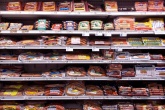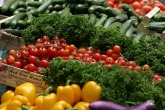Food waste bill given second reading
A food waste bill introduced to the House of Commons this afternoon (9 September) has been given a second reading by MPs.
The Food Waste (Reduction) Bill, presented by Kerry McCarthy, Labour MP for Bristol East, under the House of Commons 10-minute rule, will be drafted and read to Parliament on 29 January.
Provisions laid out in McCarthy’s bill include the obligation of supermarkets to donate unsold foods to charities (which has also been considered in a French legislative proposal), the publishing of food waste arisings in the food manufacture supply chain and the concentration on enforcing the food waste hierarchy through incentives.
Should it be passed, the bill would require supermarkets and manufacturers to reduce their food waste by 30 per cent by 2025, in line with European Commission target of reducing all food waste by 30 per cent from 2017 to 2025 and the sustainable development goal of halving per capita food waste at the retail and consumer level by 2030.
Presentation of the bill

McCarthy added: “More than half of the food waste is waste by the food industry across the whole supply chain.”
This waste is generated, according to McCarthy, by “poor demand forecasting, over-ordering and cosmetic requirements. An estimated 20 to 40 per cent of perfectly edible fruit and veg is rejected by supermarkets before it reaches the shops.
“In the UK we redistribute just two per cent of our fit-for-consumption surplus food. France redistributes 20 times as much, so we could be doing much better.”
McCarthy also spoke of a visit to redistribution charity FareShare this week, and claimed that according to the charity, which supplies food to homeless shelters, refuges, food banks and lunch clubs, if 25 per cent of the UK’s surplus food was redistributed to charities it would save the voluntary sector up to £250 million per year, “making surplus food the second largest supporter of charity after the Big Lottery”.
In France, following the removal of food waste articles from a recent Energy Transition Bill for procedural reasons, supermarkets agreed a voluntary commitment to reduce food waste and redistribute consumable food to charitable causes.
However, McCarthy reported that at the recent Stockholm Food Forum some companies expressed a preference for legal obligations “so that there is a level playing field”.
Concluding her presentation, McCarthy stated: “The current approach of nudging us along the way with a few good initiatives, some education and some encouragement is not enough when the imperative for action is so great.”
The bill will be prepared and drafted by a group of cross-party MPs including Caroline Lucas (Green), Zac Goldsmith (Conservative) and McCarthy.
Read about the Food Waste (Reduction) Bill.









